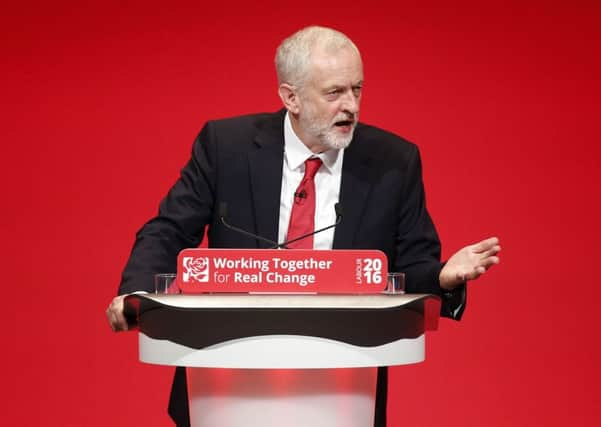A hard left Corbynite Labour Party has logic, and could help the political centre


A survey for the programme asked voters where they placed themselves on the political spectrum.
Only 10% described themselves as left wing, and not much more than that (13%) said they were right wing.
Advertisement
Hide AdAdvertisement
Hide AdA further 15% considered themselves to be centre-left, and 17% labelled themselves centre-right.
That leaves 45% who located themselves as moderates in the political centre.
This ought to be bad news for the Labour Party. Only 25% of voters consider themselves to be left of centre, and only a minority of them unequivocally on the left.
It ought also to be bad news for the Conservatives. Only a slightly higher percentage of the British people, 30%, label themselves right of centre, and only a minority of them firmly right.
Advertisement
Hide AdAdvertisement
Hide AdThe findings should be great news for the Liberal Democrats, who in theory are the party closest to the political centre ground.
But which of the parties have in fact sought to dominate the centre ground over the last 30 years or so?
In the 1980s, when Margaret Thatcher was in power and Labour was clearly well to the left of centre it was, as you would imagine, the centrist parties, then the SDP-Liberal Alliance.
But the Liberal Democrats, who emerged from that partnership, have often sought to distinguish themselves as uncompromisingly radical on matters such as the EU and civil liberties.
Advertisement
Hide AdAdvertisement
Hide AdIn 1992, a Conservative prime minister, John Major, resonated with the moderate middle more than the Labour leader Neil Kinnock, who despite beginning the process of modernisation was considered by the electorate to be ‘old Labour’.
In 1997, Major lost the centre ground to Tony Blair.
In 2001, Blair held the centre ground over William Hague. In 2005, he held it again over Michael Howard.
But in 2010, David Cameron regained the centre ground from Gordon Brown and he consolidated it against Ed Miliband in 2015.
Now Mr Corbyn is consciously abandoning the middle ground, perhaps in the bold belief that it will prove popular with voters.
Advertisement
Hide AdAdvertisement
Hide AdBut even if he realises not, there is logic to his approach.
If Westminster elections used proportional representation, as they ought to do given the increasingly splintered voting patterns (I supported the AV compromise in 2011), the country could still conceivably have four main parties: a socialist party, a centrist/centre-left party, a centrist/centre-right party, and a firmly right one.
It is likely that a combination of any two of those four parties would then hold power in coalitions.
The emergence of Ukip offered a route to that scenario, by moving into the terrain of the traditional Tory right (law and order, patriotism, anti EU, anti immigration).
Advertisement
Hide AdAdvertisement
Hide AdIt is unclear, however, if Ukip can survive the loss of Nigel Farage. My suspicion is that it will not remain a serious political force, because as I get older it becomes clear to me how important a good leader is to success in business, sport, politics, or many other roles from running schools to regiments.
But the logic of Ukip is impeccable in an age in which the Conservative Party is chasing the centre (which it did not do under Hague/Duncan Smith/Howard, with bad electoral consequences).
There is a parallel logic to a Corbynite Labour Party, which after all was founded to represent the working man more specifically than the middle England courted by Tony Blair.
A socialist Labour mirror image of Ukip would be a party that gets all of those 10% of voters who think themselves left wing, but only some of the 15% who consider themselves centre-left.
Advertisement
Hide AdAdvertisement
Hide AdWhat it cannot expect, with such an ideology, is to be a party that makes inroads into the 45% who consider themselves to be moderate,
An uncompromising socialist party will not in Britain even get all of that aforementioned centre-left voters, and so the most it ought to get in terms of vote percentage is high teens.
It will take a long time for Labour to fall as low as that in the polls but only because it has for most of its existence been in power or had a plausible prospect of being so.
It built up a core vote. Mr Corbyn’s radicalism, as unveiled at this week’s conference, ought to be the latest stage in a process that trades that core vote for purity.
Advertisement
Hide AdAdvertisement
Hide AdA biography of the postwar Labour prime minister Clement Attlee, by a Northern Irish academic John Bew, has been receiving admiring reviews in the national press.
Many critics have contrasted Mr Attlee’s patriotism with Mr Corbyn’s tolerance for enemies of Britain, including the IRA.
My own view on Mr Corbyn remains that he is a decent man but hopelessly naive about human nature.
That he stood for a minute’s silence for the notorious IRA murder gang who were stopped by the SAS at Loughgall in 1987 tells you a lot about his instincts.
Advertisement
Hide AdAdvertisement
Hide AdHe probably believes such sectarian killers were freedom fighters but knows he cannot say it. Other stances have confirmed such a recklessly generous interpretation of events (his belief that the UK could further liberalise immigration on top of millions of net immigration arrivals this century shows that he is not concerned at how Angela Merkel’s experiment turned out).
What Mr Corbyn does to the Labour Party is a matter for them and not – as some observers have been gravely warning – a bad thing for democracy.
A Labour movement that stayed permanently true to his values alongside the survival of Ukip could be a good thing for political moderates in the UK.